'SAPPERS DELIGHT'
By Jorg Kempka
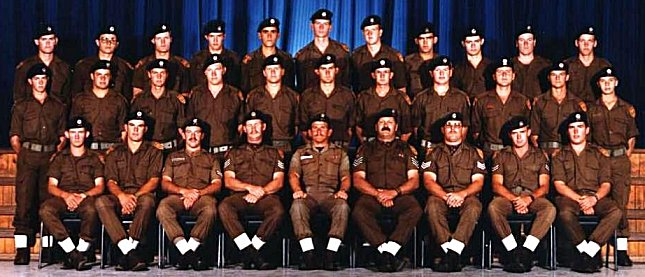
Class of '84. Bravo Platoon. 21 Field Squadron
Hi my name is Jorg. Born and bred in Joburg in the good ol' suburb of Melville. I would like to share my experience as a troop in the SADF from 1984 – 85.
I actually did not think about the reasons or why we were called up for national service. I thought its part of growing up and everybody you knew has done it, so I better do it.
I started receiving my call up papers in 1979, hence my army number starting with 79. I can't remember that number anymore. I was deferred three times, still in school or at tech. college was the reason. I always thought later I should have gone to that one, or that one, or Cape Town, or Pretoria (Yeah. Close to home!).
Anyway time came, January intake it was for Bethlehem 1984 in the sunny Freestate.
Preparation time: I don't think anyone was fully prepared to start their military training. Mentally and physically a challenge. The concept of purchasing a long chain with several pad locks (specially marketed by Viro) to lock your washing to the clothes line, really got me worried. As far as fitness goes. Prepared- NO. I still get the shakes thinking about it.
2 Field Engineers Regiment was going to be home for a while.
All packed and very nervous I arrived at Joburg showgrounds to be sorted and shipped out by train to Bethlehem.
The first taste of someone with stripes on his sleeve shouting and calling you names made me uneasy and more nervous. Saying goodbye to the folks and to my fiancé was hard. No more "sleg civie" (comfortable civilian). The transformation had begun.
I can't remember much about the train ride down to Bethlehem, but I do remember our arrival. WOW! Lined up and indoctrinated.
"You are now government property and we can do whatever we want with our property to achieve what we want! Do you hear me?" JA COPORAL.
Haircuts and medical were first on the agenda. Its amazing how the same haircut (shave) makes everybody look the same. I think that's the idea. The medical went quick – there were a lot of bodies to process. I actually felt proud when they presented me with an ID card displaying G1 K1. Other guys got G2 K3 or G3 K2 etc. etc. Never really knew what that all stood for. G1 K1 as I later found out, meant license to "af kak" (suffer).
Kit issue was quite exciting. It felt like becoming part of something. I was average size so I had no problems fitting into stuff, but boy did the tall and the very short guys have a hard time!
I also remember clearly that same day we were introduced to leopard crawl. I don't think the scabs on the elbows healed for about 3 months.
Motto for every day. "Don't walk - Run! Hurry up and wait!"
2 Field regiment was main base. We were allocated to the outside camps 21 and 22 Field Squadrons respectively. My new home was 21 Field, and off we went to start Basic Training.
My first impression of the so called bungalows (barracks) was that they were going to be cold. It was confirmed in winter. Bethlehem is known to be the coldest place in southern Africa in winter. Just my luck!
Bravo platoon was going to be my family from now on. The most interesting thing at that stage was to find out how a mix of so many different types of people would cope as a unit. And by golly it did.
The biggest barrier being language. English - Afrikaans. But that disappeared soon.
A few items of interest were as follows.
Blisters. "Go see the medic". The quick and most effective treatment was to suck out the water with a syringe and needle and pump in some mercurochrome. It burned like hell, but it dried it out instantly.
Inspection. A new meaning to square. Everything had to be square. Socks , balsak (duffel bag) and bed edges etc. With a bit of starch, one could work wonders.
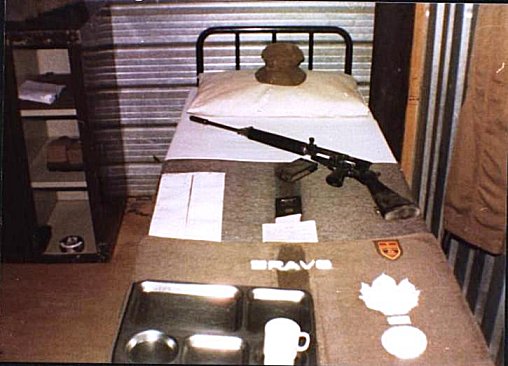
Inspection Bed
Bed rowing sessions. If your bed was not flat enough and had a bit of a hollow section to it, you were then requested to sit on the bed and start rowing with your rifle. While rowing your corporal would empty out a fire bucket of water over you and the bed. What a mess. I found that to be the most hilarious thing that happened in basics. You just could not keep a straight face when that happened to some one and subsequently everybody who did laugh, got the same treatment. I recall on one inspection the whole platoon jumped on their beds and started rowing as the corporals walked in. A classic!
Food. Lots of variations of the same thing I guess. My personal favourite (not); "pilchards in tomato sauce" served cold with scrambled rubber eggs? At 3.30 am. Enough said.
Midnight "training sessions". Commonly known as 'op vok' sessions in the middle of the night involving a considerable amount of PT with full kit. Designed to build comradeship or teamwork by breaking you down mentally and physically. Nice.
I suppose everybody knows about fetching leaves off the constantly wrong tree? Well we had a `pink pole'. Run to, around and back, altogether in a certain time, until you made that time.
Getting married. What a proud day it was. She was this oil soaked R1 rifle. `This is your wife now, you will eat, sleep and do everything with her. And keep her clean at all times.' The R1 sure shoots beautifully. I always enjoyed going shooting and just to brag a little, I was the first one in our platoon to receive 'skiet balkie' (shooting medal).
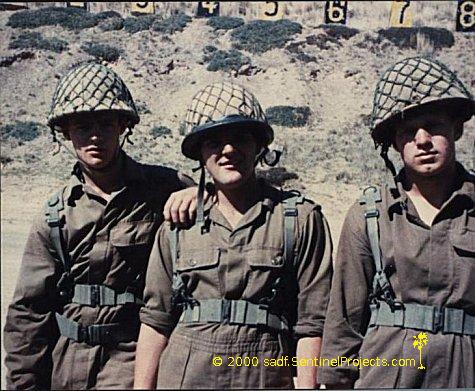
At the shooting range
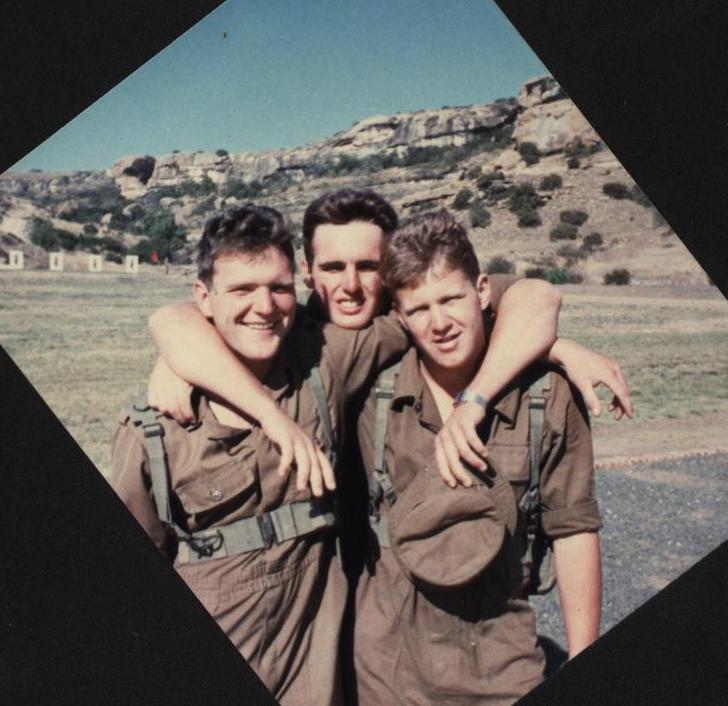
MATES (Author on the left.)
2.4. Fitness test everyday. A 2.4 km run with full kit or as a team carrying poles. That training paid off big time in the months to come.
1st Beer. I think we were allowed 3 beers after 6 weeks. It was amazing to see so called 'seasoned drinkers' as ourselves slurring our words after one or two beers.
Church on Sunday. Now that was an occasion. We got to dress up with all our badges etc. and strut into town. It was great just being able to sit still for ¾ hour. Most of us fell asleep. After church was time to indulge in civilian food and at the local 'take away' a vetkoek Dagwood was the best on the menu.
2ND Phase Training. Now was time to train seriously and become a sapper. There was water purification, bridge building, demolitions, mine detection and bunker clearing to be learned. Always keeping in mind that we will be using this stuff on the border, kept us on our toes. This was all taught with utmost professionalism and the various instructors we encountered with their own field of expertise, was really amazing.
Now with the coloured 'balkie' under the engineer's insignia on our beret, we called ourselves trained field sappers. What a feeling, we had made it – all in one piece.
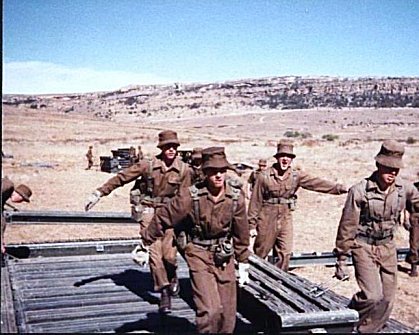
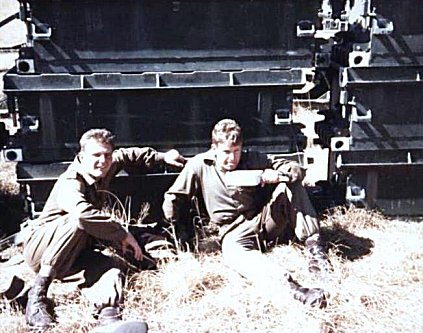
Bridge building
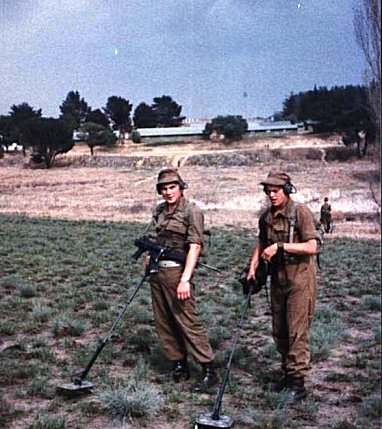
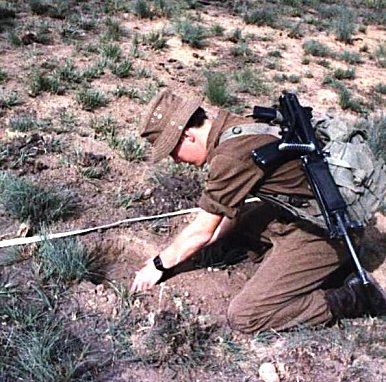
Mine detection
That meant we were ready for the border and that was scary. We did not know what to expect and heard all these stories. You could imagine how we felt.
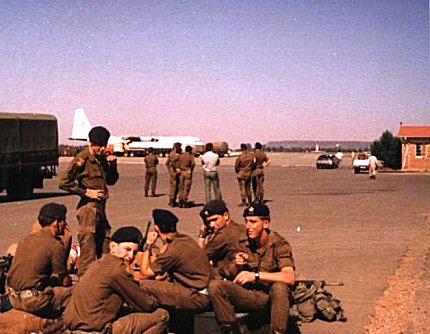
Waiting for the Flossie
Waiting on the tarmac at Bloemfontein Air Force base for our C130 Hercules (Flossie) was sure exciting. An uneventful flight brought us to Oshakati. The most noticeable was the climate change. The heat hit you like a brick wall. After 10 days orientation and training, we were shipped out to the outside camps to represent the SAEC and support various infantry units. The 2 units we did support were a commando unit from Cape Town and the Parabats. The time we spent with the bats was a chapter one could write a book about. Very interesting indeed.
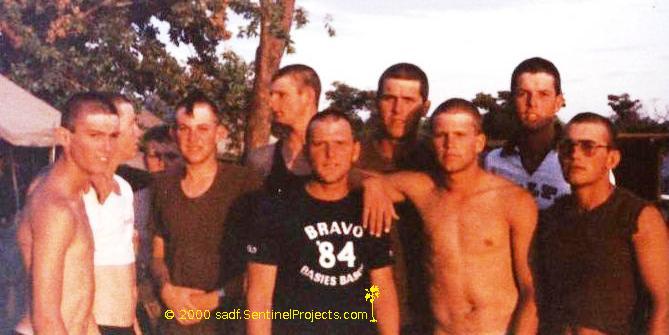
SAEC Okankolo
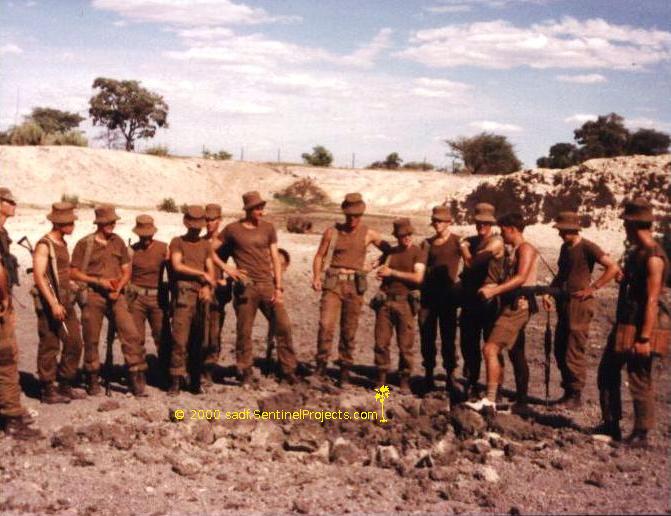
Demolition training
The main tasks at Okankolo were to supply the camp with drinkable water which was pumped from a nearby shona (that's a depression in the ground that fills up with rain water in the rainy season). To stand guard and do a daily 30 km mine sweep enroute to Ondangwa. The other 'kak' job was to build and maintain the French drains.
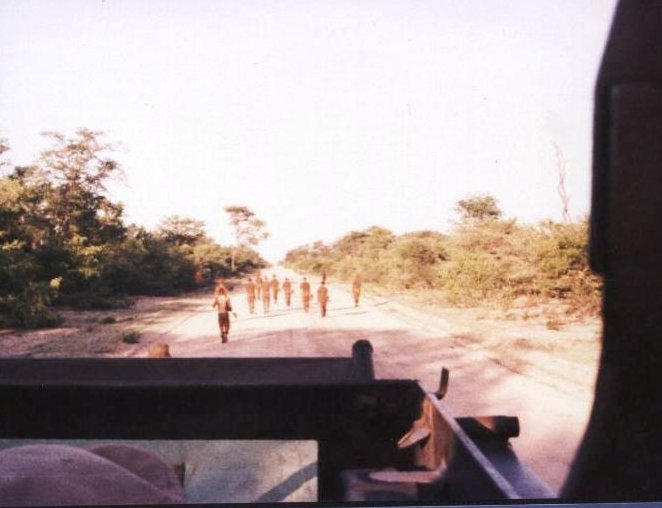
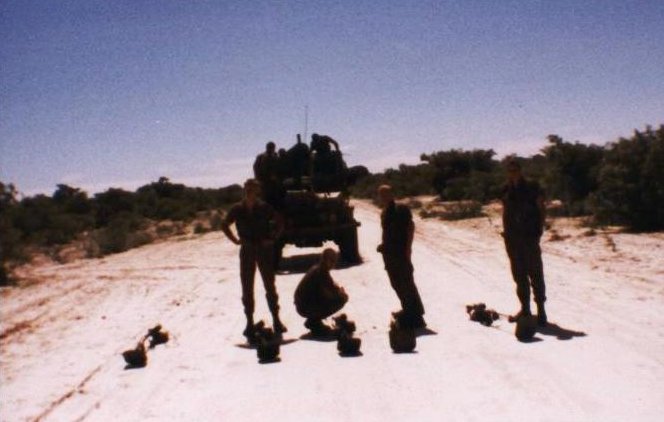
Daily 30 km road sweep
The camp was 'revved' (attacked) once with small calibre mortar. No injuries and little damage to the camp, but you should of seen the counter attack, it was overwhelming. Whatever we had, we fired towards the unseen enemy in the bush. This included mounted mags and 80 mm mortars. There was a big enquiry about it.
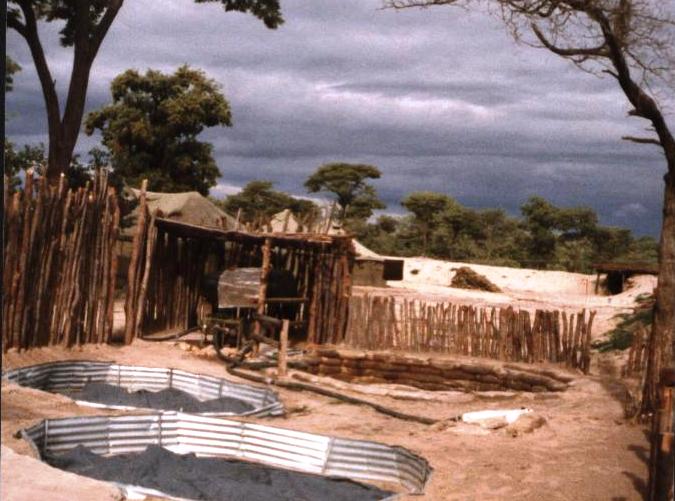
Water purification plant
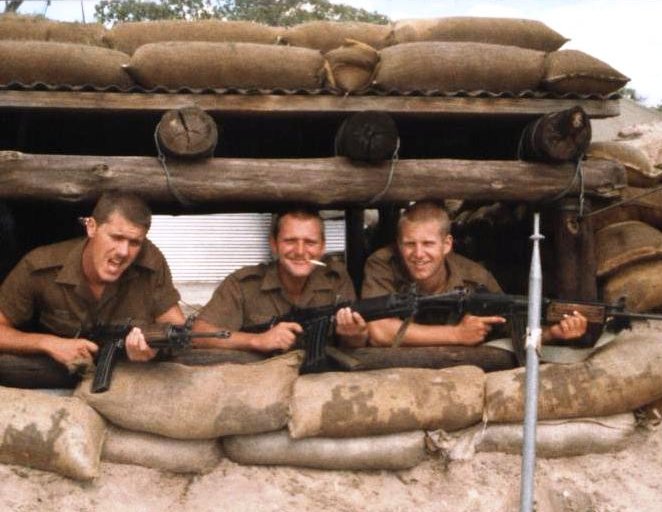
Gate duty
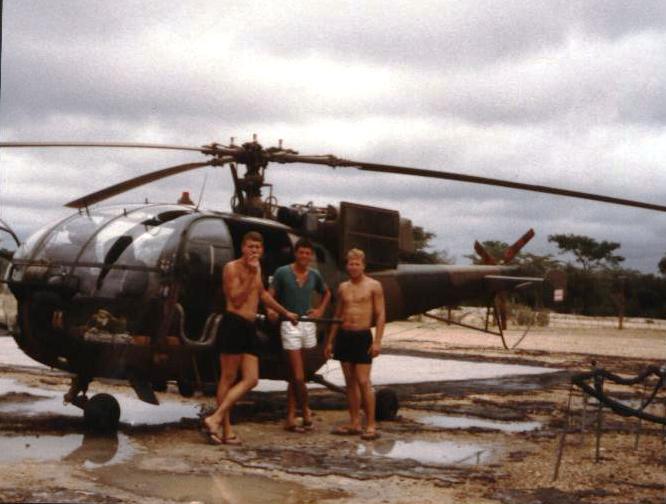
Gunship visit
One day the buffel convoy was ambushed on the return sweep. Some Swapo dude shot a RPG into one buffel at close range injuring one of our Parabat colleges.
Christmas was the time one really missed family and friends, but we made the best of it and opened our 'dankie tanie' packets.
So after a few months we enjoyed a long mid year pass back home and got ready for the 2nd tour of duty.
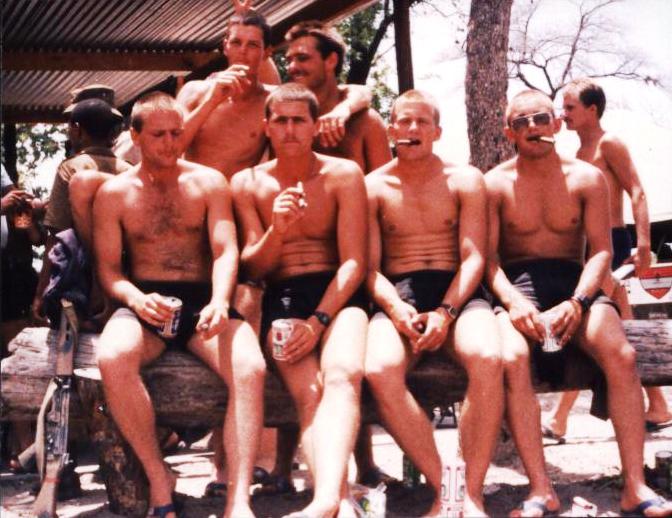
Christmas '84
We were back in Sector 10 after leave and found out they were looking for volunteer sappers for 101 Battalion. So as a group of nearly all the same guys as before, we volunteered being based in Ondangwa. With 2 to 3 week long excursions into the bush and cross border operations, we saw and experienced the war from a different perspective, first hand in many situations. It was a real eye opener. A couple of good stories to be told, but we will keep those for another time and reminisce around a braai now and again.
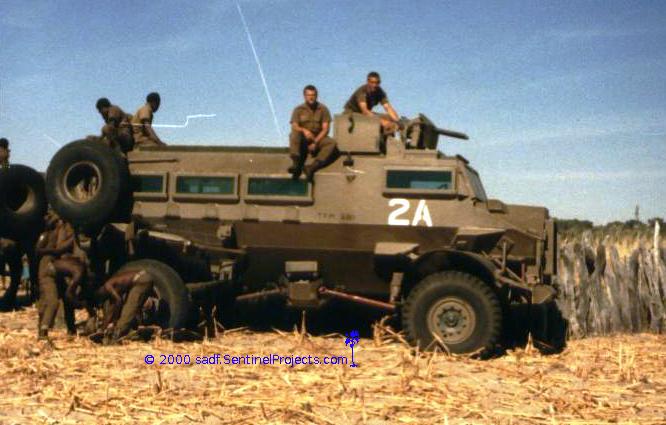
101 battalion RM2 1
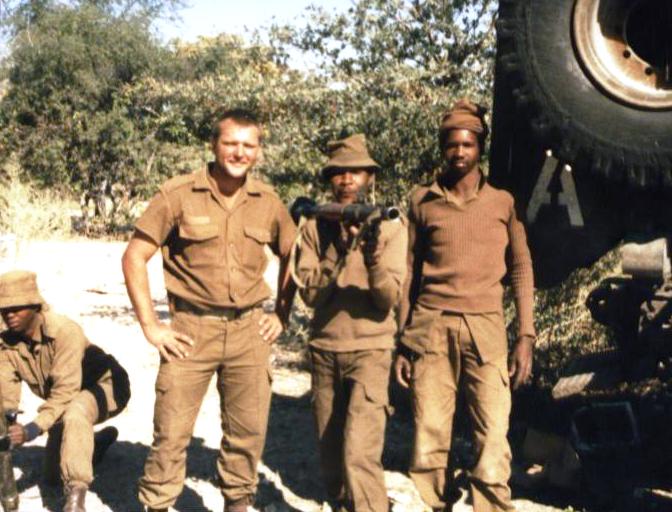
101 battalion RM2 2
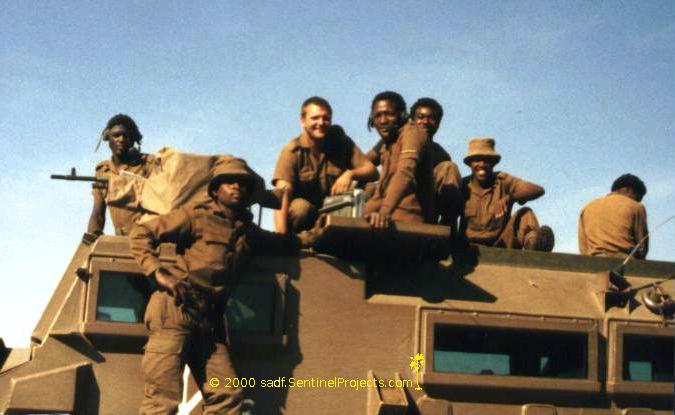
101 battalion RM2 3
As time went on, we started getting that 'min dae' attitude. I think one gets a bit slack, which is not a good idea - but civvy life was calling. We departed back the same way we came. Did we make a difference? Has anything changed? Those questions we could only answer years later.
Passing out parade felt great. Even though we did not perform a final march due to weather, we marched up to receive our pro patria medal with pride. With the medal on our chest – the world belonged to us. What an experience – what a great day.

GV manne
It was weird being a civvy again. I did not know what to do. There was no routine. There was no shouting. My wife said I was walking around at night, checking stuff!!
The hardest transition for me back to civilian life was when I started my apprenticeship. Here was I, the 'grensvegter' being told what to do. That was a bit harsh on the system, but I got over it and managed with a good attitude. At least they gave us a year off our apprentice for doing national service.
I think it was a year after `klaaring out', that I received a call up for camps. The next place of interest was going to be Sasolburg Command. For a month every year for about 5 years we got to stand guard on various stragetic locations, patrol the area and my favourite – 'Bike Squad'.
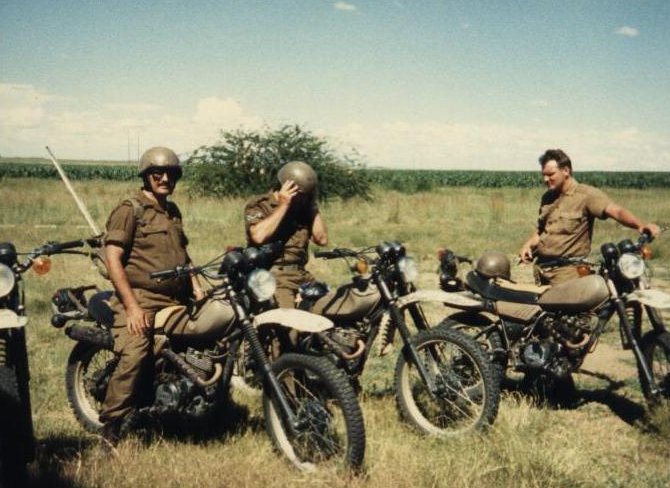
Sasol command bike squad
Conscription was abolished. I felt relieved and happy to end that chapter in my life. I am glad I did it and came out still in one piece. It made me stronger and more resilient, it armed me with something to cope with. And yet I am still to see the sense in what we did. Who won the war? The commies are still around, Angola is still in shambles. The ANC are ruling the country and SAM is president of Namibia. Go figure.
Thank you for your time and letting me briefly share my experience. I would like to thank all the people and organizations that made it that little bit easier for us, and a big thanks to my folks for their and assistance (food, washing, ironing and for my dad for the late night drop offs at camp) And of course my beautiful wife who stood by me through thick and thin.
Cheers
Jörg
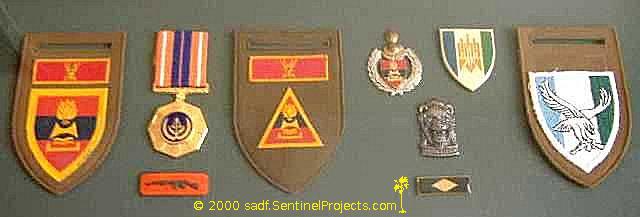
P.S. what music do you remember from 1985? My favourite at the time – Dire Straights 'Sultans of Swing'.
Published: 28th February 2006.
Here is a shortcut back to the
Sentinel Projects Home Page..
